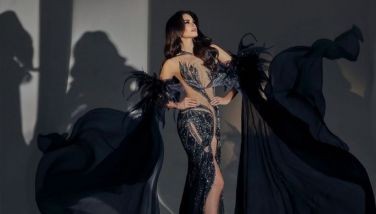More talent than ego
May 25, 2003 | 12:00am
 These days it appears that a singer has to be his or her own songwriter to be respected. Part of the reason, for instance, why boy bands are disdained is that they merely make "covers" of someone else’s songs. Meanwhile, "Indie" acts, to which boy bands are typically contrasted, are almost automatically praised for their "originality," "grit" and "edge," in no small part because they compose their own songs–a situation that isn’t without irony, because it would seem that iconoclasm is the ticket to legitimacy. The contempt for covers has been such as to make boy-band boys "protest too much": they use every chance they get to claim co-authorship at least of one or two songs in their albums, usually the ones which do not get released as singles.
These days it appears that a singer has to be his or her own songwriter to be respected. Part of the reason, for instance, why boy bands are disdained is that they merely make "covers" of someone else’s songs. Meanwhile, "Indie" acts, to which boy bands are typically contrasted, are almost automatically praised for their "originality," "grit" and "edge," in no small part because they compose their own songs–a situation that isn’t without irony, because it would seem that iconoclasm is the ticket to legitimacy. The contempt for covers has been such as to make boy-band boys "protest too much": they use every chance they get to claim co-authorship at least of one or two songs in their albums, usually the ones which do not get released as singles.
While there is something to be said about writing one’s own music, the case is not so simple as a choice between creativity and mimickry. A distinction should be made between making a version of a song (creative interpretation) and merely copying an existing recording (sheer cannibalism). Some covers are as memorable as their originals because while we hear the same words, each expression is unique. (Think of the many versions of My Funny Valentine: Sarah Vaughan’s, Julie London’s, Barbra Streisand’s, Chaka Khan’s, even Matt Damon’s.) Moreover, the case against covers rests on the dubious assumption that original material, simply because it is original, is good. True, many a singer-songwriter excel in their art, but a number of these hyphenated superstars do nothing more than vent out their frustrations in the loudest possible registers ("Listen to me: I’m so lonely, my life is so screwed up, the world is a mess," etc.). In the final analysis, they stand to be remembered more as arrivistes than artistes.
How refreshing, then, to find Michael Bublé’s eponymous debut album. Bublé belongs to that old line of singers which can be traced to Bing Crosby and Frank Sinatra and which today includes Michael Feinstein and Anthony Warlow. His album harks back to a time when singers were simply singers, and songs need not have an angry message, the days when songs could have rhymes like: My nights were sour/spent with Schopenhauer.
Michael Bublé, a 25 year-old Canadian, is David Foster’s latest offering. Foster introduced Josh Groban last year, and what Groban has become in "popera" is what Bublé bids fair to be in swing and smooth jazz. Like Groban, he comes across as unpretentious and unassuming, a young man with more talent than ego. Bublé’s advantage over Groban, however, is that the genre he is in is less forbidding and is, in fact, a genre built on the principle of individual improvisation.
Much of the album consists of music from the ’30’s and ’40’s, with a few songs from more recent times thrown in, all done with the ebullience only a novice can possess. Here is neither tired, formulaic singing by over-the-hill artists who have run out of songs to sing nor tongue-in-cheek kowtowing to the classics by someone who knows nothing about the musical tradition, but a young voice singing with reverence and, you can tell, pure enjoyment.
Bublé’s models are easy to spot. When he swings, he sounds like Harry Connick, Jr.; and if you close your eyes, you’d think that it is Sinatra you’re hearing. This is not to say that he is wholly without his own style, but that the torch has been safely passed to the right hands.
Two of the best tracks in the album are Kissing a Fool (one of the more recently composed songs) and Put Your Head on My Shoulder. Both prove that you don’t need new material to be new. The first, written and recorded by George Michael in 1988, is given more brass, more piano, more vibrant vocals; and the result is a version that brings out the nuances of the lyrics better than Michael’s, good as it was, ever did. In remaking the Paul Anka classic, Bublé does away with the original "doo-wop" arrangement, adds more strings (arranged by William Ross), slows down the tempo, sings Julie London style (i.e., very relaxed, almost recitative, phrasing)–and the effect is moonlight and romance. (Incidentally, Paul Anka is the executive producer of the album.)
Ultimately, what this album does is to remind listeners of that vast repertoire of songs that make you wonder why some people even bother to write things that the world can very well do without. Fever, Summer Wind, The Way You Look Tonight–these will certainly outlive the slew of "hits" that clutter the airwaves today, and if this album is any indication, Bublé’s share in that consummation will not be small.
BrandSpace Articles
<
>
- Latest
- Trending
Trending
Latest
Trending
Latest
Recommended






























